Should Software Companies Charge for Technical Support?
I personally believe that technical support for most software should be free, especially if it’s the result of poor software, of buggy software, or even just badly designed software. There are a few exceptions of course, but overall I don’t believe software companies should charge for technical support. To be quite frank, in a lot of cases it’s a conflict of interest, plain and simple. Especially if the the technical support is a profit stream for the company!
Let me give you an example. I’m going to compare my company LandlordMax which sells property management software (also known as real estate rental property software). Most of my competitors (without naming names) charge hourly for technical support (upwards of $200/hour). My company absolutely does NOT charge for any technical support. So why do most of my competitors do? Because this is a big source of revenues and profits for them.
To be quite frank, none charge a an understandable amount like $20-$50 an incident, where the goal is really just to recover the costs of offering the support. Rather most of my competitors will charge per the hour or require a minimum yearly support contract. The worse one I know of requires a minimum support contract can be up to 75% of the purchase price – in other words, you almost pay double the listed price for the software in support, and it’s required (you cannot purchase the software without the support contract). I don’t know why it’s like that in my industry, or how it got that way, but it seems to be pretty common. And I absolutely don’t agree with it!
So why is this bad in the first place? Why is this a conflict of interest? Well if charging for technical support is a profit stream for them, wouldn’t resolving ongoing issues, improving the usability of the software, fixing bugs, etc. be against their best interest. Sure they have to achieve a minimal level of sales, but after a certain point it can quickly become much more profitable to charge people to help them use your software than to acquire new customers. Especially if their data is locked in. You see in my industry, changing software solutions often means either re-entering all your data or starting from a clean slate, which is not what you want for managing real estate (your history is very important).
It’s so rampant in the real estate rental software industry (charging for support) that many companies have gone so far as to also charge significant amounts for training. Now I can appreciate that for some software solutions you will require training, but I can’t see how managing properties is one of them. At least not for all classes of your customers. I can see why some assistance may be required for a networked office with a team of people using it. But a small property management company or an individual real estate investor probably shouldn’t require extensive training. But that’s just my opinion. After all, what do I know about the industry, I just run one of the top property management software companies.
Without naming names again, I can tell you that for one solution I tested I couldn’t even figure out how to create a building and tenant to setup them up with a rent. I had to revert to reading the user manual, and even then it wasn’t perfectly clear, I had to fiddle around a bit. And this was a bigger player at the time (some years ago). Incidentally, they’re pretty much on their way out now.
But it’s not just support and training, what about documentation? Something to remember is that writing documentation such as a user manual, online help, FAQ’s, etc. does cost money. I’ll be the first to attest that our online documentation isn’t perfect, and we’re definitely working to improve it. Nonetheless, it’s better than most of our competitors right now.
And to be quite honest, as a company you provide documentation for several reasons, not all of them altruistic. Firstly to help your customers learn your software. Secondly to help them discover things it can do that they weren’t aware of. But you also leverage your documenation to reduce your support costs. That is to say, that for every person that can find the solution on their own on your website, that’s one less support request you have to handle. That’s one less support request you have to pay for. So it’s to your advantage to improve your documentation.
Now if you charge for technical support, where you not only just make your costs back, but where you actively make a nice profit, where is the motivation to improve the usability of your product? Where is your motivation to improve your documentation? It’s partially there, so much as you can get sales. But to truly maximize your profits you would probably want to make your documentation just good enough to get the sale but not good enough for the customer to figure things out on their own later so that they have to pay for support. That would be the optimal setting in such a setup.
Everything said, please bear in mind that I’m not advocating that all companies who charge for support are out to make money from you. In most cases they aren’t. What I’m against is companies that make bigger profits from charging for technical support. As soon as you turn your technical support into a profit stream, you’re basically setting yourself up for a conflict of interest. It’s unfortunate, but that’s just the way it is.
Like a proud parent (and as a disclaimer), I also have to take a second to brag about my company LandlordMax. So if you’re not interested in our metrics please do skip to the last paragraph. With a lot of hard work, we’ve been able to almost eliminate our support costs for existing customers. What this means is that almost all our support requests are pre-sales. Questions asking if the software can do this or that, which in most cases the answer turns out to be yes.
Generally once someone has purchased LandlordMax, they don’t contact us for further support, they’re completely self-sufficient. I’d say that 90+% of our support requests from existing customers can be categorized into two groups. They’ve either bought a new computer and want to transfer their data from one computer to the other, or they’ve lost their license information and need us to re-send it. Rarely do we get support requests otherwise. It’s all pre-sales, people asking for more information on what the software is capable of. Which tells me where we need to improve the most (yes, the website – which by the way we’re on the verge of releasing a major website update in response to this).
And just in case you’re wondering which types of solutions I would recommend charging a minimal cost for, to at least cover your own expenses of running support, would be software offerings such as an operating systems (you can’t control the crazy stuff people do to their computers), a system that requires a high level of technical skills (like setting up a server, a network system, a database, etc.), a system were the users can script part of the program, etc. Basically where it’s no longer self-contained. Where it could no longer be classified as shrinkwrap software.
Permalink to this article Discussions (10)
A Quick and Simple Way to Improve Your Productivity in Under One Second!
The quick and short answer, disconnect your internet cable from your computer for at least a day. You will be shocked at just how wired and distracting the internet can be!
Sometime last week our internet connection was lost due to a cut wire in the ground. Needless to say, it took a few days to get everything back and running. But what I learned over that time is how much more productive I was without the internet!
I’ve always believed myself as very productive and efficient in what I do, wasting very little time to unwarranted distractions. What I never really realized before is just how many interruptions the internet has to offer. Not necessarily in terms of me wasting time surfing, but the notifications, popups, and all other things that try and grab my attention.
First there’s email. I generally only check every few hours, but now I had no reason to check at all. I had no emails to respond to. Nothing. That sure freed up a lot of time. Now I wouldn’t offer this as advice to follow on a daily basis, but if you need a specially productive day, few days, etc., then just disconnecting completely from email can have a large impact on your productivity. And it’s not just the time lost task switching, it’s also the time it takes to read and respond to your emails.
After email another common problem is web browsing. Basically without an internet connection you can’t take a quick five minute surf break that accidentally ends up being a lot longer. I know when I get pretty tired I just fire up my web browser and check Hacker News, my Google Reader feeds, and so on. It does refresh me a bit, but not nearly as much as stepping away from the computer for a few minutes. Plus you never accidentally lose more than a few minutes if you don’t surf.
And it’s not emails and web surfing, if you don’t have an internet connection you can’t have a chat client open. You can’t have a twitter client open. You can’t take a quick peak at the weather, the news, etc. Basically you’re forced to focus on your work and nothing else. If you’re tired you get up and take a break, otherwise you’re focused on accomplishing your work.
Of course this doesn’t mean you should just be heads down working, everyone needs to come up for a breather once in a while. Take some 5-15 minute breaks when you’re tired. Do stop for lunch. Do get up when you need a break. The key is that you’re limited in what you can and can’t do, forcing you to better focus on your work at hand. Try it for a day, you might be surprised at how productive that day is. I definitely wouldn’t do it every day, but once in a while it’s a really good thing. Especially with looming deadlines!
Permalink to this article Discussions (2)
Top 10 Reasons to Take a Break

As many of you know, I took the summer off from writing on this blog. Actually it was a bit more than the summer, but close enough. Anyways, the reason I took the break is that I needed time to recharge myself. And this of course led me to this post.
Nobody can work forever at a grueling pace, it’s just not possible. Everybody needs to take a break or holiday here and there, some more than others. And today we’re going to cover the top 10 reasons why you and everyone else needs to take breaks from time to time.
1. Your body needs to relax
As simple as it may sound, everybody needs to slow down once in a while. As much as some of us want to believe we can work through anything, we are human and our bodies and minds do need to rest. You can only keep going on fumes for so long. It’s even harder if you quit caffeine!
The other thing to remember is that it takes a bit of time to unwind. Weekends aren’t really enough to catch your breath. Even a one week holiday barely gives you enough time to unwind. Most people find that they finally really start to relax after a few to several days of rest, which means by the end of a week you’re finally starting to truly relax. It’s generally not until the second week of holidays that you really relax and benefit from your holidays. Unfortunately for a lot of us, it’s very difficult to take more than a week at a time of holidays.
And just taking a day off here and there is definitely not enough, sometimes you truly need to take some time to slow down your pace. It’s amazing the difference it can make. Don’t fool yourself into thinking that one day off is enough to fully recharge, it’s not. It’s a good start, but that’s all it really is. I view it as more of someone drowning and being able to get a grasp of air. It’s not enough to save you, but it sure does feel great!
2. Get new perspectives
If you never take a step back, you’re always going to be looking at it from the same angle. Taking a break or a holiday gives you the opportunity to take a step back and look at what your doing from a different perspective.
It’s amazing what a little difference in perspective can make. The theory of relativity is really just looking at the world from a different viewpoint. Instead of everything being absolute, Einstein basically realized that everything is relative. In other words we move relative to others, not from an absolute point in space. A simple little difference in perspective lead to a massive improvement in physics. That simple change in perspective completely changed how we view the world and lead to incredible discoveries.
While you probably won’t make the same level of groundbreaking discoveries as Einstein did, it may be enough to give you a significant boost in whatever it is you’re doing. I know being an entrepreneur sometimes I have to look at how I run my business from the outside, otherwise I would just keep doing more and more of the same. Looking from the outside allows me the opportunity to grow when and how I least expect.
3. Appreciate what you have
Like anything, if you do it too much, you start to lose your appreciation for it. For example, imagine if everyday someone did your laundry, cooked all your meals, and so on. After a while you would start to lose your appreciation for everything that’s done for you, it would almost become an expectation. Many hilarious Hollywood movies are based on this single idea.
It’s not until you stop getting the benefits that you really appreciate what you had and lost. For me blogging had become somewhat of a chore and I was no longer appreciating the benefits. And after writing for many years on a regular basis, I kinda got use to it. Once I stopped, about a few weeks into it, I started to want to write again. And the more I wanted it, the more I appreciated that I had the opportunity. And so instead of blogging being a chore as it had eventually become, it’s now something I really look forward to!
4. Improve the quality of your work
Generally if you do something a lot, you start to get lazy with it. A good example is a business manager or entrepreneur that’s had a nice growth and success history. After a few years of getting lots of good results, they may start to slack off a bit on their work because everything is going well. They have the midas touch. That or they’re getting so busy they start to take shortcuts. And unfortunately they may be able to get away with it for some time, riding on their previous successes. The bad news is that eventually it will catch up, and that’s when bad things happen. We’ve all heard stories of people who had it but then road the wave until they crashed.
For whatever reason, I find that when I take a good break, I have a tendency to ramp back up my quality of work. When you come back, you want everything to be done as best as you can. Things that you’d let slide you now address. Of course we always have to be careful about doing busy work just to be busy (like making sure your email inbox is completely clean). It’s just that in many cases you feel refreshed enough to address some of those bigger issues head on rather than deferring them where before you would defer them as much as you can. You’re up to dealing with the hard issues.
5. Disconnect to relearn how to focus
It’s amazing how good it can be to disconnect. Turn off your cell phone. Step away from your emails. Instead of always being on, multitasking like a mad person, it’s great to be able to relearn to focus.
We’re so used to constant distractions in our day and age that we forget how intrusive they can really be. After you’re disconnected for a while, you start to realize how many of those distractions are really just disruptions. You don’t need to receive all your emails right away. You don’t need to address every issue right now. You don’t need to respond to every email this minute. The world doesn’t come to a grinding halt! It’s good to remember that once in a while.
6. Discover and learn new things
How often can we just take the time to learn new things which will in turn make us that much more productive? To be quite frank, most people just keep doing things the same way because of two reasons.
The first is because they’ve always done it that way and they always will. It’s easy and they’re comfortable with the way they are doing things.
The second reason is that they just don’t have the time to learn anything new. That, or in my opinion, they don’t take the time. That is to say they don’t really understand the value of learning.
For example in software development I believe it’s crucial that you investigate your possible solutions before jumping on what you know. Sometimes the difference can be an order of magnitude increase in productivity. Not always, but often the difference in productivity is staggering. This of course doesn’t mean research everything to death, but do take the time to look at alternative options. You might be surprised more often than you think.
This is also partially where you can get the sunk cost effect. Basically the sunk cost effect is where you keep going the same path because that’s what you’ve always done and have invested large amounts of effort and/or money to get it working. In technology, this may be where you create a framework and stick to it regardless of where the programming world is going, or even how badly it’s working out. At some point alternatives and much better solutions come around, but forcing your people to stay to a specific solution because it’s worked in the past and because you have a large system built on it isn’t always the best solution.
As a quick tip, this is why I strongly believe all companies have limited lifespans. Eventually companies get stuck in some way or other due to the sunk cost effect, and they either collapse under their own weight or another new company eclipses them by leveraging a better and more productive way of doing things. As the cliche goes, out with the old in with the new.
7. Create a strategy for the future
When we’re in the thick of it we rarely take the time to create strategies for what we’re doing. We’re mostly just acting and reacting. Rarely do we plan and strategize. It’s generally only when we take a break that we can really do this.
My favorite example for this is video gaming. Before you start a video game, especially multiplayer games, you prepare your strategy. Then you try to execute it. Rarely do you adjust your strategy in the middle of a game. You’ll sometimes make tweaks to it between games, but often they won’t be very significant. It’s not really until the time between when you end your gaming session and you restart your next gaming session that you really take the time to plan what you’re going to do. That’s when you think about what you’ve done, and what you can do to improve your gameplay.
The same is true for almost everything in life. When you’re in the thick of it you’re too busy dealing with the situation. It’s generally only after the fires have been squelched that you figure out what happened, and look at how you can prevent it for the future.
8. Spend more time with family and friends
As though it wasn’t obvious enough, we’re probably all guilty of working too much. As much as I try to balance work and play, I’m sure I work too much. So taking a break is a good time to improve that balance.
And if you think you aren’t working too much, let me ask you this: On your death bed, will you ever tell yourself you should’ve worked more? Never have I heard of an instance of someone regretting not working enough. All you hear are stories of people regretting they worked too much and didn’t spend enough time with their families. Ask yourself right now, if you only had one week left to live, what would you do? I doubt your answer would be to work 24/7 for that week. Most likely you would completely skip working. That says it all right there!
9. Catch up on much needed sleep
A really weird thing I found is that when I take a holiday, I always get a lot more sleep. Suddenly instead of sleeping 4-6 hours a day, I start sleeping 8-10 hours a day, sometimes more. Why is that? I would assume because my body naturally needs more sleep than I allow it to take. I make no mistake about it, I am in no way hiding the fact that I’m fooling myself into thinking I can do this and get away with it. No one can. Eventually something has to give.
10. Improve your health
And last but not least, it’s a good chance to improve your health. Go outside and get some sun. Exercise. Ride a bike. Take a walk. Swim. Go for a hike. Whatever activity you prefer, it’s a good time to do it. We’re almost all guilty of not exercising enough. And although exercising during a holiday is not enough, it’s better than nothing. Plus, if you’re lucky you’ll continue doing it for a long time after you come back from your holiday.
Permalink to this article Discussions (3)
Taking Summer Holidays from Blogging

For the first time since I started this blog 5 years ago, I’m going to take a summer off. You may have already noticed that I’ve started my holidays, it’s been almost a month since I last posted. I initially thought I would just quietly take a few weeks off, but now that it’s already been a month, I think I’m going to take the whole summer off. After five years, it’s been a nice break that I needed to refresh my creativity.
While I’m gone, please feel free to write comments on post to let me know what you’d like me to cover when I come back. I know what I want to write to about, but if there’s anything you guys want to me to write more about than I do now, please let me know.
And on that note, see you back here in about another month. Have a good summer!!
Permalink to this article Discussions (1)
13 Bad Excuses For Not Starting Your Business
If Nick Vujicic from the video above can do it, to be quite honest, then you better have a really good excuse why you can’t. If you’re not interested and it’s not for you, then that’s different. But if you’re using any of the excuses listed below, then I’m sorry but we’ve all heard them before. We know them all too well. These are 13 excuses, NOT REASONS, most people use for why they can’t start a business. The reality is you can, you just don’t want to enough. Because if you did, you’d find a way. None of them are reasons, they’re all excuses. And today I’m going to dispel each and every one of them.
1. I have no time.
Seriously? I call BS on that one. Almost everyone, and I mean almost everyone, has some free time or time that’s wasted.
Do you watch any tv shows? Do you go to any movies? Do you watch any sporting events? Do you go the pub/bar? Do you go out for dinners? Do you hang out on the patio or have barbecues with your friends on the weekends? I understand everyone needs time off to relax and so on, but no one said it was going to be easy either. If you do the math, and really look at how you spend your days, I have no doubt you can find at least 10 hours a week. And everyone can find at least a few hours each week!
2. I don’t know how.
Here’s a big secret, no one else really does either. There is no manual to being an entrepreneur. We just figure it out as we go along. The more experience you have, the better you get at it. Just like anything else.
If you want to look at it another way, it’s like riding a bike. No one knows how to ride a bike on their first try. But if you don’t start trying you won’t learn. The same is true with swimming, dancing, learning a new sport, learning a new language, programming. Even using a cell phone. It wasn’t that long ago that most people would say they couldn’t use a cellphone, and now almost everyone has one.
And unlike in the past, there’s a lot more information out there today. You’re not limited to just your local library, you can order virtually any book from Amazon. And if you don’t have the money, you can always research everything you need online on the internet. There’s no end of entrepreneurial information out there. The fact alone that you’re reading this article means you’re already learning from the internet!
3. I don’t have the money.
And? Only a really small subset of companies actually require a significant amount of money to get going. There are many many many businesses that require very little money initially to get started. Sure IT based companies like software companies probably do require less cash (and instead require a lot more time) that a lot of other businesses, but don’t think that’s it. There’s lots of different businesses out there.
In all honesty, the problem is because most people think too big for their first company. If you really want to succeed, start on a smaller scale. Just like when you start driving a car. Is it smart to learn how to drive a car in a Ferrari or is it better to learn in a basic sedan? Do you learn to fly a plane by flying a 777 Jumbo Jet your first time in the air or do you start with a basic 2 seater plane? Therefore start a smaller business, something you can build up from, and go from there. Use the money you earn from your first business to build your second.
PS: Do you have an LCD tv? Have you taken a trip in the last while? What kind of car do you own? Do you go out to restaurants? Do you go to the movies? If you really want to, I’m sure you can find some money.
4. I don’t know where to start.
There is no perfect place to start. But like the saying goes, a journey of a thousand miles starts with one small footstep. You need to start and the rest will just happen. The biggest hurdle is generally just taking that first step. And don’t stop once you’ve started, keep going. That’s another major hurdle most people fall prey to. They get excited, take a few steps, and then basically just stop taking any steps. Don’t let that happen to you.
5. I’m too young/old.
Really? What’s too young or too old? If you’re reading this, then you’re neither too young or too old. Age is a perception thing, it’s really all in your mind. It’s not a valid reason.
6. No one will give me any money.
Fine, then start something else. This is back to #3, maybe you should start something smaller. Don’t try to fly a Jumbo 777 jet your first time flying. Just because no one will give you money for THAT SPECIFIC business, it doesn’t mean you have to stop everything. There’s more than one business in the world.
At the very least, you can look at starting a smaller idea. It’s the same as when you start your career. No one will hire you as the president or CEO of their company when you first start. You have to build up your career, establish yourself. Start with a smaller business and create a history of success.
7. I’m waiting for the perfect idea.
Good luck with that. You’ll be waiting forever. There is no such thing as the perfect idea. And to be honest, there’s lots of ideas out there. Executing on your idea, I would say, is more important than the idea itself.
8. What if I fail?
What if you fail? What’s the worse that can happen? As Tim Ferris put it in his book The 4-Hour Work Week, what’s the absolute worse that can happen if you fail? If you really think about it, it’s probably not nearly as bad as you think. For sure you won’t die.
And failure is not a bad thing. Of course you’d prefer to avoid it, but so what if it happens. Imagine if you had the same avoidance of failure with everything you did. How would you ever have learned to drive? And by the way you can die learning to drive! How would you have learned to ride a bike? How would you ever visit a foreign country? Learn a new language? Learn to fly a plane? Learn to dance?
9. I don’t have the skills or experience
Were you a professional driver when you first got your driver’s license? Where you a professional basketball player the first time you tried to play basketball. What about doctors? They have to start somewhere. Everyone has to start somewhere, including entrepreneurs.
Don’t worry too much about this. Early on you’ll make more rookie mistakes, but that’s part of learning. As time goes on, you’ll find it gets easier and easier. For example, how difficult was it when you first started driving? Did you make silly mistakes (while still surviving)? Did it take almost all of your concentration? Did you drive at full speed? Now how do you drive? Is it much easier? Now you’re probably not thinking about the details, you’re thinking more of your route (strategy) rather than how much to push on the accelerator and if you’re too close to the car in front of you (daily busy work). Those things become intuitive after a while.
10. There’s too much competition.
There’s no such thing as too much competition. A large number of competitors means the market is too segregated which means there’s no dominating player. That’s really good!
If there’s only a few big competitors, you’re in even better luck! The big guys are just as scared of you as you are of them. Once a company has become big, bureaucracy sets in and doing anything, especially anything innovative, becomes very hard. Which also means don’t try to compete with them head on where resources are the key to success, focus on where they can’t compete! Innovation, customer service, quickness of execution, and so on.
By the way, competition is a good thing. It’s much harder to be the first because not only do you have to sell your product or service, you also have to educate people about it. Personally I prefer only having to deal with one hurdle at a time.
11. I have to wait until everything is lined up just right
This will never happen. All entrepreneurs will tell you this is a pipe dream. You’ll never have everything perfectly lined up.
Now that doesn’t mean don’t plan and try to prepare beforehand, it just means don’t ever expect to have everything perfectly lined up to start because it won’t happen. And in all honesty, no business ever goes 100% smoothly. You just have to roll with punches and adjust as you go.
My favorite analogy, which I’ve taken from the software world, is the classic example of driving a car. When you drive, do you lock your steering wheel and move forward, or do you continually make small adjustments, turn when needed, and so on. If you locked your steering wheel, you probably wouldn’t even make it past your street. The same is true with business. Nothing ever lines up perfectly, you just have adjust as you go.
12. It’s just too risky.
Is it really? How risky is your job? With a business you have multiple clients whereas with your job you have just ONE SINGLE CLIENT. All your eggs are in one single basket. So if your one single client decides they no longer need you, or they can no longer afford you, you’re revenues (paycheck) goes to $0. With a business, if one client drops you because they themselves run out of money, it’s not the end of the world because you generally have many other clients.
By the way, if you run your own company, you know what’s going on. As an employee, you can easily be blindsided and laid off at any moment. And we’re seeing a lot of that today. You’re at the mercy of management, which means you may not know until the last minute. Not only that, but it’s possible you could lose your job just to improve a balance sheet for investors and nothing more. You really have no control of what may happen, nor are you always going to have knowledge of what’s coming.
13. I’m still working on my business plan
This is my favorite which I saved for last! I’ve seen too many would-be entrepreneurs working on their business plans forever, never to actually execute on it. It’s much much much easier to write a business plan than to start a business. Plus you don’t have to push through all the hard walls and issues you’re going to encounter when starting.
Common variations of this are people who move from business plan to business plan. People who endlessly try to perfect their business plan. People who work on the minute details of their business plan forever.
By the way, a business plan is really just to give you an idea whether your business concept is feasible or not. Don’t ever try to execute it to the letter, it will never work as written. What you’re doing is writing down your assumptions and projections, that’s it. As you develop your business, you’ll find where you made errors in your assumptions and projections, and you should adjust accordingly. Trying to force a business plan to life is a recipe for failure. It’s really more of an initial guideline, almost to force you to think about what you’re going to do before you do it.
You’ll also find that as you become more and more entrepreneurial, you’re less and less likely to write up a business plan. After you’ve run a few companies, you don’t need to go through all the detailed planning because you already have a good idea of what’s coming ahead. Plus, your business plan rarely survives it’s first encounter with real customers. But if you’ve never started a business, it’s a good place to start. Just don’t focus too much on getting it perfect, or ironing out all the details. The business plan’s goal is to help you develop your idea, not write it in stone. You don’t have to follow your business plan perfectly, no successful entrepreneur ever does!
Permalink to this article Discussions (3)
You Can Only Achieve What YOU Believe You Can Achieve

What’s the furthest you believe you will go in life? Do you believe you will own your own company? Do you believe you will be the boss at your job? Do you believe you will climb Everest? Do you believe you will make $1,000,000? Do you believe you will marry the most amazing person?
Firstly, notice I said believe and not think you can. With that in mind, which of the above questions do you truly believe you will achieve?
Now here’s the kicker, I can pretty much guarantee you that if you don’t believe you will achieve it, then you won’t. It’s not very complicated, it’s really that simple!
In the movie Fired Up!, an Animal House style movie, there’s a scene where the team believes they suck and because of that they do! That’s when the hero chimes in with a pretty colorful and somewhat offbeat speech about the importance of believing that you’re good. Below is the exert with some edits (to keep it cleaner for this blog):
– Sorry, guys, I just suck.
– It’s not just you. We all kind of suck.
– We’re not good at all.
– Hey, stop. Stop talking like that.
– But it’s true.
– We’re just not that good.
– Stop.
– Enough of that. You can go as far as you want.
– What do the Panthers have that you don’t have?
– Skills.
– Athleticism.
– Kickass cheers.
– Laser hair removal.
– Big-a** t******. I’m just saying.
– Confidence. They’re cocky a*******.
– Like Nick, the cockiest a******* on the football field. That’s why he’s good.
– He’s right. I’m awesome.
– Because he believes in himself.
– Also because I’m awesome.
– He knows he’s gonna be good, so he’s good. And he takes chances.
– Not hard due to the fact that I’m awesome.
– Nick. Trying to make a speech here.
– I’m sorry.
– Either bet big or go home.
– If you don’t wanna take any chances, then you shouldn’t even be here.
– I know you wanna be here, because you finish last every single year… but you keep coming back… even if it means taking endless shit… from total dong-knockers like the Panthers.
– All right. Come on, guys. Let’s be cocky a*******s.
– Yeah, you know what, he’s right.
– And I can say that… because I am the best cheerleader here, so you can all suck my d***.
– I was just being a cocky a*******.
– Oh, nice. That’s what I told you. Look, did you see what she was doing there?
– That’s exactly what I want from everybody.
– All right, let’s do this.
– And remember, you’re awesome. Let’s risk it to get the biscuit.
– All right, get cocky, b******.
– Let’s do it. Come on, guys. Ready.
– Hit it!
Although a bit colorful, and not exactly what I meant the idea is still really there. If you don’t believe you will succeed you won’t. And because the team thought they were bad, they always finished last.
As an aside, if you don’t believe in yourself, you’ll never take chances, which means you can never really lead. Part of success is also knowing how to create your own luck.
Let’s look at a more concrete example that you can associate in your life. Let’s say you’re making $50,000/year right now and you believe you can’t make more than $65,000. Will you ever make $75,000? No! Why? Because if you don’t think you can make that much, you’ll never ask for that much. You’ll never try to make that much. You won’t do what it takes to make that much. You may achieve up to $65,000, but you’ll never go above that level because that’s as much as you believe you can make.
The same is true with your dream job, the raise you want, the promotion you want, and so on. If you don’t believe in it, you will never try or get it. The very fact of not trying alone will prevent you from succeeding.
And it’s not just jobs, the same is also true for finding your perfect girlfriend/boyfriend/wife/husband. How many people are just too shy to approach the person they really like? They just sit there and wait, thinking they don’t deserve that person. They never take the chance. How many movies are about someone in love but never having the courage to take that initial leap?
The reality is that you have to believe you will succeed to succeed. When I started LandlordMax, I knew it was going to be a success. It was a fact a fact in my mind. And it is succeeding!
As Jeremy Clarkson from Top Gear so well put it in the Bolivia Special episode (4:48): “If you believe something will happen, it will happen”.
Whichever questions above you answered no to, I can almost guarantee you won’t ever achieve. If you don’t believe you can do it, you won’t. It’s not very complicated, it’s really that simple!
In the movie Fired Up!, an Animal House style movie, there’s a scene where the team believes they suck and as such they do! But then our hero explains, in a pretty colorful and more entertaining method, the importance of believing that you’re good. The following is the exert:
Looking at a more concrete example. Let’s say you’re making $50,000/year right now and you believe you can’t make more than $65,000. Will you ever make $75,000? No! Why? Because if you don’t think you can make that much, you’ll never ask for that much. You’ll never try to make that much. You won’t do what it takes to make that much. You may achieve up to $65,000, but you’ll never reach above that level.
The same is true with your dream job. If you don’t think you deserve or can do it, you will never try for it. The very fact of not trying alone will prevent you from succeeding.
And it’s not just jobs, the same is also true for finding your perfect spouse. How many people are to shy to approach the person they really like? They just sit there and wait, thinking they don’t deserve that person. They never take the chance. How many movies are there about someone trying to fall in love with their dream person but never having the courage to take that initial leap?
The reality is that you have to believe you will succeed to succeed. When I started LandlordMax, I knew it was going to be a success. As a matter of fact, I also didn’t really have a choice. It had to succeed. As Jeremy Clarkson from Top Gear put it in the … episode, if you believe it enough, you can will it to happen!
Jeremy clarkson
Sorry, guys, I just suck.
– It’s not just you. We all kind of suck. – We’re not good at all.
– Hey, stop. Stop talking like that. – But it’s true.
We’re just not that good.
Stop.
Enough of that. You can go as far as you want.
What do the Panthers have that you don’t have?
– Skills. – Athleticism.
– Kickass cheers. – Laser hair removal.
Big-ass titties. I’m just saying.
Confidence. They’re cocky assholes.
Like Nick, the cockiest asshole on the football field. That’s why he’s good.
– He’s right. I’m awesome. – Because he believes in himself.
Also because I’m awesome.
He knows he’s gonna be good, so he’s good. And he takes chances.
Not hard due to the fact that I’m awesome.
– Nick. Trying to make a speech here. – I’m sorry.
Either bet big or go home.
If you don’t wanna take any chances, then you shouldn’t even be here.
I know you wanna be here, because you finish last every single year…
but you keep coming back…
even if it means taking endless shit…
from total dong-knockers like the Panthers.
I wanna cut the blond one.
– What? – What?
– What? – What?
– What? – I’m just saying.
All right. Come on, guys. Let’s be cocky assholes.
Yeah, you know what, he’s right.
And I can say that…
because I am the best cheerleader here, so you can all suck my dick.
I was just being a cocky asshole.
Oh, nice. That’s what I told you. Look, did you see what she was doing there?
That’s exactly what I want from everybody.
All right, let’s do this.
And remember, you’re awesome. Let’s risk it to get the biscuit.
All right, get cocky, bitches.
Let’s do it. Come on, guys. Ready.
Hit it!
Permalink to this article Discussions (1)
Top Entrepreneur Movies to Watch
In no particular order:
 |
Wall Street (1987)
There are numerous lessons to be learned from this movie. It’s probably THE most famous business. What’s more, it’s still amazing today, 20 plus years later! Some of my favorite quotes include: “It’s not a question of enough, pal. It’s a zero sum game, somebody wins, somebody loses. Money itself isn’t lost or made, it’s simply transferred from one perception to another”. “Life all comes down to a few moments. This is one of them”. The most valuable commodity I know of is information”. And probably the most quoted: “Greed is good.” Although the above quotes are mainly about greed, which is the central theme of this movie, there are many many many lessons to learn. There’s ambition, taking chances, the power of information, and so on. An interesting tidbit, one of the pivotal scenes of this movie is quoted as part of another movie in this list (The Boiler Room). |
 |
Startup.com (2001) The story of a group of friends from high school who decide to start a dot com business at the height of the dot com boom (aka mania). It starts off as you would expect, with lots of excitement and energy. But as the business grows, VC money becomes more and more important since there is no real revenues. To avoid spoiling the movie for those that haven’t seen it, let’s just say a lot of issues have to be dealt with. This is a great movie for people thinking of starting a business with a group of friends, of exactly what can happen and what you should discuss beforehand. Plus it show the importance why a business should be run to be profitable. The whole movie is really about getting the next round of VC (Venture Capital), it’s not about how to grow the business to earn more money. I don’t even remember this being discussed once in the whole movie! |
 |
The Secret of My Succe$sThe Secret of My Succe$s (1987)
The Story of an ambitious young man who wants to conquer corporate America. Although he doesn’t climb through the proper channels and there’s plenty of 80’s style “you can do anything”, there’s lots of good lessons. For example, in the movie he was able to climb just by filing the proper paperwork! Some great lessons include the power of charisma, the power of information, the value of social networks, and so on. Although this may be a more arguable point, that sometimes it takes a bit more than hard work to get ahead, you also need to create your own luck. I would of course not recommend creating luck the way Brantley (played by Michael J. Fox) did in the movie, but the idea is that he took his destiny into his own hands. |
 |
Jerry Maguire (1996)
Ignoring the two big quotes from this movie: “You had me at hello” and “Show me the money”, this movie is what entrepreneurship is all about. Jerry is a successful agent for his clients at a large firm when he comes to the realization that things aren’t working for him. He writes a mission statement of what the company should be, where agents should have less clients so that they can foster better relationships. Needless to say, this doesn’t go well. So he sets off on his own to start his own company with his own clients which will be run according to his mission statement. He will focus his business on managing less clients but taking more time and effort with each client. On building relationships with them. And like any business, the start can be rough. It never quite goes as planned (it honestly rarely does – double to triple your estimates, and not your best estimates), and in this movie he almost loses everything. But he is able to pull through, and he does succeed. |
 |
Hitch (2005)
You might be wondering why this movie is in the list, it’s because it’s not just about romance. Business is about understanding your customer’s problems and finding solutions to those problems. In this case Hitch is a successful consultant not only because he’s good at what he does, but also because he’s figured out what his customers want, even when they don’t really know it. What’s also interesting is this is one of the few movies you see someone be selective with their customers, and even fire their customers. Hitch interviews all his clients to make sure their intentions are good, and only then will he work with them. If he finds out later that they aren’t, he immediately fires them. All around a good movie showcasing the importance of understanding what your customers problems are and finding solutions for them. As an added bonus, he always demonstrates the power of word of mouth marketing! His business is not exactly something you want to advertise on a billboard, so it has to be through word of mouth. And he is successful. |
 |
Forrest Gump (1994)
Shrimp anyone? Even Lieutenant Dan didn’t believe Forrest could start a shrimping business. The main lesson here is that it doesn’t take brilliance to start a business, anyone can. Sure Forrest had a little luck because of a storm that wiped out his competition, but had he not tried he never would have gotten anywhere. And he definitely wouldn’t have been on the cover of Fortune Magazine as depicted in the movie. Starting and running a business takes more than skill. It takes a lot of hardwork. But most important, you have to actually start the company! As I’ve said before, Ideas are a Dime a Dozen. Not to downplay them, but the concept is that coming up with an idea is not hardest part of a business, executing the idea is. And in the movie, we see Forrest does just that! |
 |
Baby Boom (1987)
A high powered executive (known as the Tiger Lady) inherits a baby and suddenly finds her life turned upside down. She eventually makes the decision to move away to the country to raise the baby. Once there, she comes across the idea of creating high quality baby foods for a niche market. Being the 80’s and all, there’s the classic montage of her building her business into a very successful business, so successful that her previous company offers to buy her out. The biggest lessons learned from this movie are about the importance of niche markets. How it’s important to focus on thing and be the best at that thing. Had she created another brand of baby food, it would’ve just been another baby food company, and she would’ve had no chance. Instead she found a segment of the market she wanted, then she spend some time analyzing that market for it’s potential (yes, you actually see her analyze her market segment/niche in the movie). It’s important to have a USP (Unique Selling Proposition), and J.C. (the high powered executive) definitely figures hers out. |
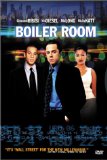 |
Boiler Room (2000)
You would think this is the movie to show you what not to learn about business because it’s all about scamming your customers. True, I agree, but there are still several things to learn. My favorite quote: “And there is no such thing as a no sale call. A sale is made on every call you make. Either you sell the client some stock or he sells you a reason he can’t. Either way a sale is made, the only question is who is gonna close? You or him? Now be relentless, that’s it, I’m done.” That’s right, this movie is mainly about high pressure sales tactics. Although I personally disagree with this kind of sales tactic, but it’s still important to understand because it will eventually be used on you. They also discuss about market segmentation, but not exactly in those terms. They discuss how some customers are more profitable then others, and how to identify them. How to determine which are the fat whales. There are some other great lessons in this book, especially the importance of questioning a too good to be true deal. You’ll definitely get learn something from this movie. |
| Pirates of Silicon Valley (1999)
Who doesn’t know Bill Gates or Steve Jobs? What better movie can there be on business than the story of how those two started their companies. Although it’s not exactly known for it’s accuracy, it’s still an amazing movie with a lot to learn from. These are two different people that both succeeded wildly yet took very different paths to success. What’s also very interesting is the impact of some of the decisions they made early on. There’s a saying that basically goes along the lines of, you can be good in business and succeed, but you need to be both good and be lucky to succeed wildly. They were both good, and fortunately for both for them, they also both made some very good decisions early on. |
|
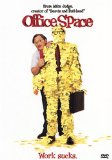 |
Office Space (1999)
How can this movie not be on the list. It’s a classic! Of course it’s not so much about learning how to run a business as it is about how NOT to run a business! But still this movie is just too hilarious to leave out. Examples of how not to run your business include TPS reports. Or having a dozen managers ask you about your TPS report. Can you imagine having to deal with that many managers? One of my favorite quotes is: “Yeah, I just stare at my desk; but it looks like I’m working. I do that for probably another hour after lunch, too. I’d say in a given week I probably only do about fifteen minutes of real, actual, work.”. How can you expect any company to excel and lead if you’re people are that de-motivated. |
 |
Cocktail (1988)
In this movie Brian (played by Tom Cruise) is a very ambitious young man excited to get his start in the business world. He quickly learns that none of the big companies are interested in hiring him without a degree, so he unrolls at the local city college and starts a part time job where he meets his counterpart for the movie. Together they go through quite an adventure. They decide they’re going to open their own bar called Cocktails and Dreams. But to do this, they need money, and this is where they start to diverge on their paths. This also where the biggest lessons can be learned. Having a business partner is not something to do on a whim. It’s very difficult, you need to have the same goals, you need to be able to work together through the tougher times, you basically need to work better together than an old married couple. Above that, and the usual business lessons, another interesting aspect of this movie is that not all money to start your company is equal. That is to say, just because you can get money, it doesn’t mean you should. It may or may not be worth the costs. So be careful when you take money for your business, make sure it’s worth the cost for you, not just personally, but also that you’re not giving away too much for it. |
 |
Rudy (1993)
Rudy is here because it’s so inspirational. Rudy is a movie based on the true story of a “5 foot nothin’, 100 and nothin’ with barely a speck of athletic ability’ man who achieved his dream of playing in a football game for Notre Dame. No one believed he could, not even his family or friends, no one. However through sheer will and determination Rudy was admitted to Notre Dame, got on the football team, and got to play one game. That’s amazing considering he had everything going against him! He worked hard, he persevered where most people would’ve quit. He worked so hard that when the coach said he wasn’t going to be able to play him on his last possible game, the football team revolted and refused to play unless he got dressed. Not only that, they got him on the field. And best of all, as far as I understand Rudy was the only person ever to be carried off the field on the shoulder’s of the other players. That’s how much they respected his dogged perseverance! |
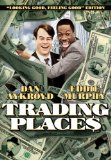 |
Trading Places (1983)
In this movie two investors/businessmen decide to make a $1 bet to see if they can turn a successful person into a homeless criminal and homeless criminal into a succesful business person. It has all the charm of an 80’s comedy. But above that, the two main characters invest and work the commodities market, along the way exposing mis-perceptions about the American Dream. And as a benefit, you’ll actually get to learn about how the commodities market work. And if you’re a bit confused by how the end goes, the following is a good explanation. |
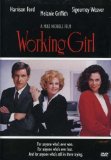 |
Working Girl (1988)
Ignoring the massive 80’s Big Hair, this movie is the story of Tess’s climb up the corporate ladder during the big Merger & Acquisition fad of the 80’s. Above the normal business lessons, this movie really shows the importance of social skills in business. Not only do you need to be smart, but you need to be able to work with people. You need to understand other people’s needs. You need to be able to communicate with other people. And most importantly, it really helps if other people believe in you. |
 |
Aviator (2004)
This is the story of Howard Hughes, from his beginnings all the way to the end. Even though Howard had some personal issues, but he was still an amazing businessman. How many people are willing to make the types of bets he did on succeeding? Betting the whole company many times over? There’s no doubt he was a very smart person, but he also had a lot of ambition and was willing to put his money where his mouth was. And not just on a small scale, but on a massive scale. What I found most interesting is that all the while he was creating and growing his company he was also battling some very big inner demons. He was able to succeed where most people would’ve crumbled, and he built a largely successful company above that. |
 |
Newsies (1992)
Business is not all about making smart decisions and executing on them, it’s also very much about the people behind the business. Without people there is no business. And this movie is in this list because it shows the importance of people. Not so much about getting the right people, that’s another lesson, but in treating your people right. In the movie, the owner of the newspaper company basically decides to decrease the pay of the newsies, which they don’t appreciate. This leads to a strike. Do remember of course that this movie takes place many years ago, when child labour was common and striking wasn’t unionized as it today. In any case, the lesson here is to remember to treat your employees well. This not only includes paying them what they deserve, but also treating them the way you’d like to be treated. It will make a difference in the long term, as Hearst (the owner of the newspaper company) learned the hard way. |
 |
Click (2006)
As important as your business is to you as an entrepreneur, you also have to realize that there are other things that may be even more important. In this movie, Michael (played by Adam Sandler) learns the hard way that climbing the corporate ladder isn’t the most important thing in his life. His family is the most important thing. When starting, and even when running a largely successful company, too many entrepreneurs focus solely on their companies forgetting almost everything else, even their own basic health! And in some cases, they sometimes wear this as a badge of honor. Yes your business is important, but is it the most important thing in the world? You should always ask yourself what the most important thing in the world would be if you had a heart attack today? |
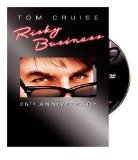 |
Risky Business (1983)
First there’s the obvious standard business lessons. You need a product that people want. You need to market it. You need to … But what’s more interesting is the underlying theme of this movie, which is how greed can corrupt people. Joel starts off innocently enough, but by the end of the movie his business venture isn’t exactly what you’d call mainstream. Mainstream or not though, all businesses obey the same core principles. As he describes at the end, his business is “Dream Fulfillment”. Find what a customer needs and fill that need. |
 |
Tucker: The Mad and his Dream (1988)
To quote the tagline: “When they tried to buy him, he refused. When they tried to bully him, he resisted. When they tried to break him, he became an American legend. The true story of Preston Tucker.” If his story doesn’t inspire you to build your company, I don’t know what will. What’s great about this movie is that it shows that sometimes you need more than sheer will, you also need a bit of salesmanship to go along with it. You need to to sell people on your idea, and more importantly on you! |
 |
Gung Ho (1986)
Although dated, this film shows that business isn’t just about ideas and execution, it’s also a lot about culture. And although this movie is about the 80’s business Japanese business culture clashing with the 80’s American business culture, it’s about a lot more than that. Mergers and acquisitions aren’t always as rosy as they appear on paper. Just because two businesses can appear to have “synergy”, it doesn’t mean they will work well together. But the biggest lesson to take away is that all business have cultures that get established within them. These cultures can be good or they can be bad for the business. It’s therefore very important to cultivate cultures that will benefit the company, especially because it’s extremely hard to change them later. |
 |
Tommy Boy (1995)
“Holy Schnike”, Tommy Boy is on this list? Yes it is. Why? To quote Ray Zalinsky (played by Dan Aykroyd): “Truth is, I make car parts for the American working man because I’m a hell of a salesman and he doesn’t know any better.” In other words, a great product doesn’t make a great business. It sure helps, but it doesn’t guarantee you’ll succeed. Betamax was better than VHS. The Mac was better than Windows in the 90’s. There’s countless examples of products that were superior but lost out. To succeed at business you need to be able to sell and market yourself. |
 |
You’ve Got Mail (1998)
Although the central theme of this movie is the love story between Joe Fox and Kathleen Kelly (played by Tom Hanks and Meg Ryan), it’s also about a small company having a big competitor move into it’s market. It’s generally better if you can be the aggressor, but if not, you need to be prepared and learn how to differentiate yourself. In this movie Kathleen’s store is very different from Fox Books, it’s personable, it’s memberable, and so on. But it’s still not enough to compete with discount prices on commodity items (the same book can be purchased cheaper down the street). She wasn’t able to learn how to differentiate herself enough before it was too late. Therefore the lesson here is don’t try to compete head on with a big company on their terms, find another way to compete with them on your terms, one which you can hands down beat them. And go from there. |
 |
Family Man (2000)
With anything else, you need to have balance. And to reach the very top of success requires a lot of sacrificing, which Jack (played by Nicholas Cage) has done in this movie. But is it worth it? Is all the money worth it? Maybe, maybe not. Assuming you don’t want to be the very best of the best, it’s important to realize that starting a business does require some sacrifices. If you want to start a business at night and on the weekends, then that’s coming out of your free time. Also expect it to take a long time, there’s no way you can do it in just a few short months. If you want to go even bigger than that and quit your job, then expect to be working more and harder than your full time job to get your company started. Success does require a great deal of effort, it isn’t easy. Otherwise everyone would be doing it. |
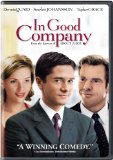 |
In Good Company (2004)
The most obvious business lessons to take from this movie is that there are multiple ways to successfully run a company. And there are the multiple approaches to building up your client base. In the movie Dan does it through social networking while Carter does it through cross-promoting, etc. Both are very successful in their own ways. Another lesson I personally cherished is that just because there’s a new way to do things, it doesn’t mean it’s always the best or right way. In many cases it is, but not always. How many of you remember the main business strategy of the dot com era? The idea of getting as many eye balls on your company’s website as possible, no matter what the cost. Dominate the market segment and then figure out how to be profitable. Always, always, listen and understand why it was done the way it was done before you jump into a new way of doing things. |
Honorable Mentions
The following are more great business related movies that you can benefit from watching, movies that I could have made fit in this list but would have made the list too long to read. They include:
- Click (2006)
- Clerks (1994)
- Mr Mom (1983)
- For Love or Money (1993)
- Greedy (1994)
- Fun With Dick and Jane (2005)
More Mentions
The following are related movies that are suppose to be really good but that I just haven’t yet seen:
- The Triumphs of the Nerds (1996)
- Glengarry Glen Ross (1992)
- E-Dreams (2001)
- Barbarians at the Gate (1993)
- Rogue Trader (1999)
- Code Rush (2000)
- Big Night (1996)
- The Corporation (2003)
- Capitalism: A Love Story (2009)
If I missed any please add them below in the comments.
Permalink to this article Discussions (2)
Why do All Degrees Take 4 Years?

If you think about it for a moment, this doesn’t make any sense at all. Really why do all degrees take 4 years. Do all degrees require exactly the same amount of education, the same amount or learning, and the same amount of experience? I highly doubt it, which means it doesn’t make sense why all college degrees take 4 years!
I won’t debate why you should or shouldn’t go to college or university, it could be to learn to learn, to acquire a skill, to acquire knowledge, etc. It really doesn’t matter for this post, the question is why does it take 4 years no matter what subject you’re getting your degree in?
Some topics are more involved than others. And it shows! I remember taking some “hard science” courses where each course had a lab section to it. If you take 5 of these courses in a semester, that was also 5 labs (don’t ask me why but I did this for a few semesters – and no I’m not insane, at least I don’t think so). For other subjects, there were no labs. Some classes had virtually no assignments where others had weekly 5+ hour assignments (university calculus classes are a good example of classes with higher workloads). If I compare my computer science assignments to my psychology assignments, well let’s just the say the amount of effort wasn’t comparable on average. And almost none of my psychology classes had any labs whatsoever. In case you’re wondering I have a BSc. in Computer Science with a Math and Physics minors. I was also just a couple courses short of a full second degree in Psychology (1 semester) before I left academia for the workforce.
Of course I assume things haven’t changed that much since I went to university years ago, except that now laptops are standard whereas when I went it was only one or two computer science students that could afford any laptops at all. Actually, almost no one had computers period. You generally had to find a friend that could help you out or go to the dreaded computer labs. That was also back when we used to walk 50 miles in blizzards with 100mph winds. But seriously, I assume there’s still as much discrepancy between how much effort goes into getting different degrees.
And that’s how it should be. Some material is harder to learn and takes more effort. That’s life. It’s just the way it is. But why is it that almost every college degree still takes 4 years. Why don’t they vary depending on what’s required?
Is it a perception thing, where people will put less value into a 2-3 year degree versus a 4-5 year degree. I’m sure that will happen, but that can’t be the real issue. At least I hope not.
Or is it that it’s just easier to make everyone go through the same 4 year program, and expand or shrink the program to make it fit it into 4 years (Parkinson’s Law – work expands so as to fill the time available for its completion.). Plus, and I just can’t resist, it’s relatively pretty easy money to have a 2-3 year program take 4 years.
Personally though, I believe the main reason is that’s easy and it’s standard to make it 4 years, no matter how much time it really takes (or should take). It’s hard going against convention. It’s the standard. Why rock the boat. And any other of the million cliches and tag lines you can come up with. Sure the other benefits are nice, but I simply think it’s because that’s the way it’s always been. And that’s why we should really question why college degrees almost always take 4 years to complete!
Permalink to this article Discussions (4)
How to Get a Pay Cut AND Be Happy About It

Let me start by asking which you’d prefer:
- A 10% raise?
- A 3% raise?
If you’re like almost everyone, the answer is hands down #1. But let me re-phrase the question a bit. Which would you prefer?
- A 10% raise in 1980?
- A 3% raise in 2009?
Is your answer still the same? I bet you think it’s a trick question because I added a year to the options. You’re right, it IS a trick question! The years 1980 and 2009 are special. Can you guess why? 1980 is very well known for having a very high inflation rate whereas 2009 is known for being a deflationary year (a year where the inflation rate is negative). In 1980 the inflation rate was 13.5% whereas in 2009 it was -0.4%. Having brought this new information to light, is your answer still the same?
In other words, which do you prefer:
- 10% raise at 13.5% inflation in 1980 = a real -3.5% raise in terms of purchasing power
- 3% raise at -0.4% inflation in 2009 = a real 3.4% raise!
Looking at the numbers adjusted for inflation, option #2 is now by far the best economical choice, beating option #1 by almost 7%!! Option #1 is actually a pay cut!
Now here’s the kicker, although most people realize option #2 is the best economically, the majority of us FEEL that the person in option #1 is HAPPIER with their raise than the person in option #2. Notice here I said feel happier, NOT that they were financially ahead! Although we’re able to differentiate between the two, most people still believe they would feel happier with option #1!!
What’s more, this same research paper (Money Illusion) also discovered that people believe the person in option #2 was more likely to leave their job. Basically, as William Poundstone summarized in his book Priceless, the overall theme of the paper is:
“$$$ = happiness = actual dollars NOT ADJUSTED FOR INFLATION”.
So how do you get a pay cut and be happy about it? Get a raise, but have that raise be less than the rate of inflation.
Permalink to this article Discussions (0)
iPad Versus Kindle
It’s official, Apple has just released the new hardware offering, the iPad a few minutes ago. It’s basically a big brother to the iTouch with some additional features and performance (at least as much as I can tell this far into Steve’s introductory presentation).
Although the price hasn’t yet been announced, I suspect this will be in direct competition with the Kindle, so it’s no wonder Amazon released their Kindle development kit early. But is it enough for Amazon?
I will bet that even if the Kindle is cheaper, and has a longer battery life, the iPad will trump the Kindle soon enough. Not only does it do a lot more (watch movies, etc.), IT’S IN FULL COLOR!! Being able to read a book in color is much more exciting than if it’s just in black and white. And Apple already has the iTunes store ready for distributing and selling digital media, including books. Never mind the hundred thousand plus applications in the App Store!
I hate to say it since I buy tons of books from Amazon, but watch out for digital media (digital books). It’s going to be hard for Amazon to compete with the iPad. Even if the iPad ends up costing significantly more than the Kindle, which I suspect it will.
Update: Apparently the battery life on the iPad is 10 hours of video or 1 month of standby time!
Update 2: I predict the demise of the Kindle if Amazon doesn’t do something very very soon. At a $499 entry price for the basic iPad, it’s a no brainer. The iPad $499 version has multiples more storage space, better processor, gaming, videos, tons of apps, books of course, and did I mention it’s FULL COLOR! The only benefit the Kindle has right now is the quantity of books and Amazon’s distribution channels. For now…
Permalink to this article Discussions (2)
| « PREVIOUS PAGE | NEXT PAGE » |




